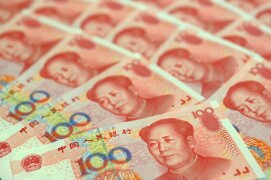The Chinese yuan is firming against multiple currency peers during the quiet holiday Thanksgiving trading session. The yuan has been strengthening since peaking at around 7.1 against the US dollar. It is likely to extend its winning streak to the end of the year after the central bank signaled that it would adjust its monetary policy directives. But how much longer will officials allow the yuan to appreciate, making its exports less competitive in the international marketplace?
The Peopleâs Bank of China (PBoC) revealed that it would begin to taper its stimulus and relief efforts, according to local state-run media. Because the economy is improving â it is one of the few major markets to record growth â policymakers do not think it is necessary to continue with an aggressive monetary campaign. But it is unlikely that the central bank would raise interest rates.
China Securities Journal, a national securities newspaper sponsored by Xinhua News Agency, wrote:
If previous rounds of withdrawing stimulus policies are a guide, âtight moneyâ and âtight creditâ are inevitable, and policy rate hikes are also normal. However, we shouldnât see the monetary authority proactively raising the policy rate for some time to come.
PBoC head Yi Gang told investors this past summer that they should prepare for the reduction of a looser monetary policy. Liu Guoqiang, a vice governor at the central bank, had suggested earlier this month that winding down its post-coronavirus efforts would happen âsooner or later.â It was also revealed by the PBoC that the central bank would employ a more flexible and targeted monetary policy to ensure the worldâs second-largest economy is still supported during these fragile times amid the COVID-19 pandemic.
Financial markets seem to think that the economy is recovering at a healthy clip and policymakers would soon withdraw from monetary stimulus. The benchmark 10-year government bond, for example, has seen its yield surge to a one-year high of 3.31%.
But a string of defaults could impact the bond market and the broader national economy. It started earlier this month when a government-owned coal company, Yongcheng Coal and Electricity Holding Group, defaulted on a $152 million bond. Since then, several more state-owned enterprises (SOEs) have defaulted, prompting market analysts to warn foreign investors from being overexposed to these risky assets. Not everyone is convinced investors will heed this advice, thinking the government will intervene and save the day.
With a central government embracing market-oriented reforms, will Beijing let them fail?
It was all quiet on the data front, with the manufacturing and non-manufacturing purchasing managers’ index (PMI) readings coming out next week.
The USD/CNY/ currency pair tumbled 0.05% to 6.5754, from an opening of 6.5790, at 14:18 GMT on Thursday. The EUR/CNY slipped 0.15% to 7.8277, from an opening of 7.8399.
If you have any questions, comments, or opinions regarding the Chinese Yuan, feel free to post them using the commentary form below.



Be First to Comment